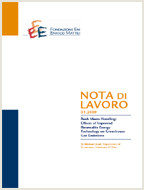Climate Change Adaptation, Development, and International Financial Support: Lessons from EU Pre-Accession and Solidarity Funds

09.10.2010
Valentin Przyluski, Stéphane Hallegatte
E61, F35, O19, O2, Q54, Q56
Economic Development, Climate Change Adaptation, Foreign Aid, European Union, Pre-acccession and Solidarity Funds
Climate Change and Sustainable Development
Carlo Carraro
Funding adaptation requires adequate governance and there are different ways to organise and channel the funds to where it is most efficient and most necessary. This paper investigates this issue and studies the practical implementation of a development under conditionality, namely adaptation-development, and its requirement in terms of financing architecture. To contribute to this research, it looks at similar problems that have been met in the past, namely the European funding programs for Eastern Europe countries that were candidates to adhesion, and European internal structural and cohesion funds. These funding examples provide a pertinent analogy for the adaptation problem, and most issues in adaptation finance have also been met in these funds (difficulty to define and measure additionality and incremental cost, concept fuzziness, need for leverage and mainstreaming, ownership and sovereignty issues). Publicly available documents from the European Commission and the European Court of Auditors are reviewed, providing interesting insights into possible implementation of adaptation finance. These insights can be summarized into seven main lessons: (1) “black-spot” programs are less flexible but more efficient than “concept-based” programs; (2) a multi-scale and multi-step approach can minimize sovereignty and ownership issue, and facilitate capacity building; (3) private funding leverage is a myth, and funding based on the “additional cost” is highly inefficient; (4) non substitutability among objectives and regions is necessary; (5) sub-national eligibility criteria are a viable solution; (6) institutional capacity matter: low-capacity countries should focus on capacity building and “black-spot” strategies; higher-capacity countries can follow a concept-based approach; and (7) the EU should use its own experience to promote its views of adaptation funds.
